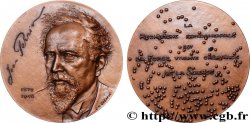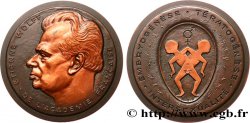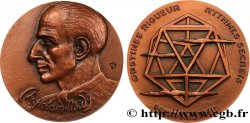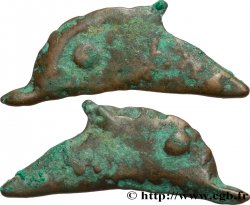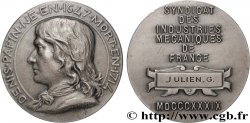Назад 1/1
fme_602891 - SCIENCES & SCIENTIFIQUES Médaille, Georges Friedmann, n°14
90.00 €
Количество
Добавить в корзину

Тип Médaille, Georges Friedmann, n°14
Дата: 1977
Монетный двор / Город: Monnaie de Paris
Количество отчеканенных монет: 100
Металл: copper
Диаметр: 77,5 mm
Ориентация осей монеты: 12 h.
Вес: 167,6 g.
Век: lisse + 1977 + corne CUIVRE + N°14/100
Пуансон: corne CUIVRE
Комментарии о состоянии
Patine bicolore, noire dans les champs et cuivreuse sur les hauts reliefs. Concrétions vertes au revers
Лицевая сторона
Аверс: легенда: GEORGES / FRIEDMANN.
Аверс: описание: Légende verticale de part et d’autre du visage du personnage. Signé : REVOL / 1976.
Обратная сторона
Реверс: легенда: L’HOMME / DE - DEMAIN / DEVRA / AU / LIEU / DE LEUR / ÊTRE - ASSERVI / SE SERVIR DE SES / OEUVRES TECHNIQUES / POUR SE LIBÉRER / S’ÉPANOUIR.
Реверс: Описание: Légende en 11 lignes autour d’un corps masculin nu.
Комментарий
Il s’agit du 14e exemplaire sur une édition de 100 médailles.
Georges Friedmann (1902-1977) fut le fondateur d’une sociologie du travail humaniste. Après des études en chimie industrielle, il entra à l’École normale supérieure en 1923. Il consacra la plus grande partie de ses travaux à l'étude des relations de l'homme avec la machine dans les sociétés industrielles de la première moitié du XXe siècle.
This is the 14th medal in an edition of 100. Georges Friedmann (1902-1977) was the founder of a humanist sociology of work. After studying industrial chemistry, he entered the École Normale Supérieure in 1923. He devoted most of his work to the study of the relationship between man and machine in industrial societies in the first half of the 20th century.
Georges Friedmann (1902-1977) fut le fondateur d’une sociologie du travail humaniste. Après des études en chimie industrielle, il entra à l’École normale supérieure en 1923. Il consacra la plus grande partie de ses travaux à l'étude des relations de l'homme avec la machine dans les sociétés industrielles de la première moitié du XXe siècle.
This is the 14th medal in an edition of 100. Georges Friedmann (1902-1977) was the founder of a humanist sociology of work. After studying industrial chemistry, he entered the École Normale Supérieure in 1923. He devoted most of his work to the study of the relationship between man and machine in industrial societies in the first half of the 20th century.








 Cообщить об ошибке
Cообщить об ошибке Распечатать страницу
Распечатать страницу Отправить мой выбор
Отправить мой выбор Задать вопрос
Задать вопрос Consign / sell
Consign / sell
 Информация
Информация